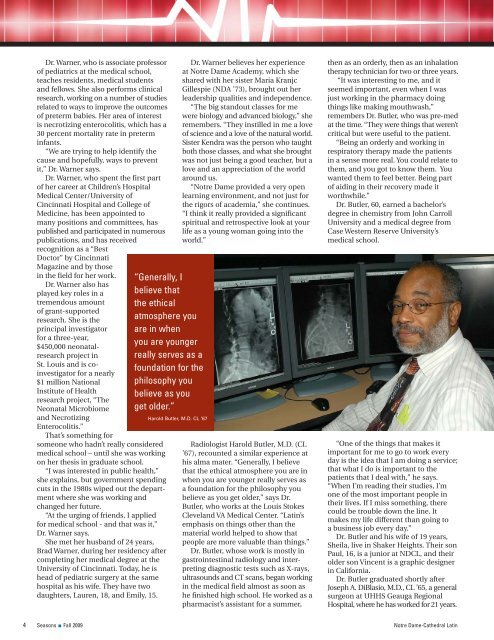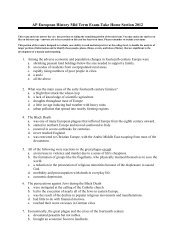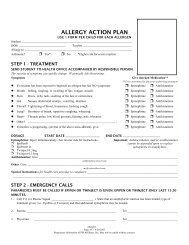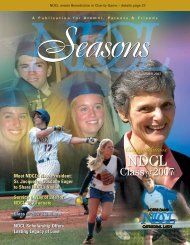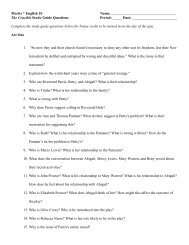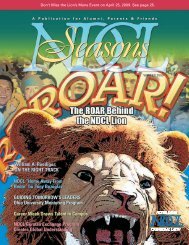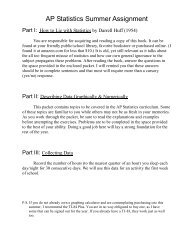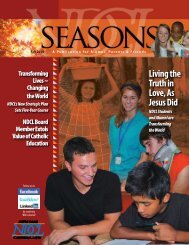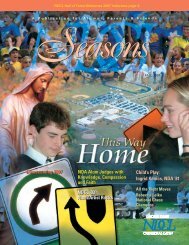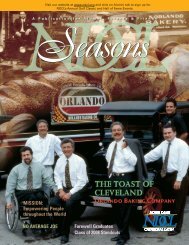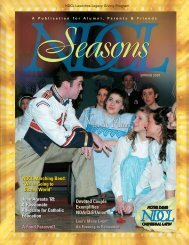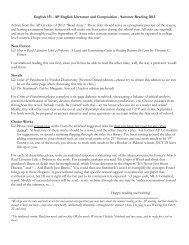Create successful ePaper yourself
Turn your PDF publications into a flip-book with our unique Google optimized e-Paper software.
Dr. Warner, who is associate professorof pediatrics at the medical school,teaches residents, medical studentsand fellows. She also performs clinicalresearch, working on a number of studiesrelated to ways to improve the outcomesof preterm babies. Her area of interestis necrotizing enterocolitis, which has a30 percent mortality rate in preterminfants.“We are trying to help identify thecause and hopefully, ways to preventit,” Dr. Warner says.Dr. Warner, who spent the first partof her career at Children’s HospitalMedical Center/University ofCincinnati Hospital and College ofMedicine, has been appointed tomany positions and committees, haspublished and participated in numerouspublications, and has receivedrecognition as a “BestDoctor” by CincinnatiMagazine and by thosein the field for her work.Dr. Warner also hasplayed key roles in atremendous amountof grant-supportedresearch. She is theprincipal investigatorfor a three-year,$450,000 neonatalresearchproject inSt. Louis and is coinvestigatorfor a nearly$1 million NationalInstitute of Healthresearch project, “TheNeonatal Microbiomeand NecrotizingEnterocolitis.”That’s something forsomeone who hadn’t really consideredmedical school – until she was workingon her thesis in graduate school.“I was interested in public health,”she explains, but government spendingcuts in the 1980s wiped out the departmentwhere she was working andchanged her future.“At the urging of friends, I appliedfor medical school - and that was it,”Dr. Warner says.She met her husband of 24 years,Brad Warner, during her residency aftercompleting her medical degree at theUniversity of Cincinnati. Today, he ishead of pediatric surgery at the samehospital as his wife. They have twodaughters, Lauren, 18, and Emily, 15.“Generally, Ibelieve thatthe ethicalatmosphere youare in whenyou are youngerreally serves as afoundation for thephilosophy youbelieve as youget older.”Harold Butler, M.D. CL ’67Dr. Warner believes her experienceat Notre Dame Academy, which sheshared with her sister Maria KranjcGillespie (NDA ’73), brought out herleadership qualities and independence.“The big standout classes for mewere biology and advanced biology,” sheremembers. “They instilled in me a loveof science and a love of the natural world.Sister Kendra was the person who taughtboth those classes, and what she broughtwas not just being a good teacher, but alove and an appreciation of the worldaround us.“Notre Dame provided a very openlearning environment, and not just forthe rigors of academia,” she continues.“I think it really provided a significantspiritual and retrospective look at yourlife as a young woman going into theworld.”Radiologist Harold Butler, M.D. (CL’67), recounted a similar experience athis alma mater. “Generally, I believethat the ethical atmosphere you are inwhen you are younger really serves asa foundation for the philosophy youbelieve as you get older,” says Dr.Butler, who works at the Louis StokesCleveland VA Medical Center. “Latin’semphasis on things other than thematerial world helped to show thatpeople are more valuable than things.”Dr. Butler, whose work is mostly ingastrointestinal radiology and interpretingdiagnostic tests such as X-rays,ultrasounds and CT scans, began workingin the medical field almost as soon ashe finished high school. He worked as apharmacist’s assistant for a summer,then as an orderly, then as an inhalationtherapy technician for two or three years.“It was interesting to me, and itseemed important, even when I wasjust working in the pharmacy doingthings like making mouthwash,”remembers Dr. Butler, who was pre-medat the time. “They were things that weren’tcritical but were useful to the patient.“Being an orderly and working inrespiratory therapy made the patientsin a sense more real. You could relate tothem, and you got to know them. Youwanted them to feel better. Being partof aiding in their recovery made itworthwhile.”Dr. Butler, 60, earned a bachelor’sdegree in chemistry from John CarrollUniversity and a medical degree fromCase Western Reserve University’smedical school.“One of the things that makes itimportant for me to go to work everyday is the idea that I am doing a service;that what I do is important to thepatients that I deal with,” he says.“When I’m reading their studies, I’mone of the most important people intheir lives. If I miss something, therecould be trouble down the line. Itmakes my life different than going toa business job every day.”Dr. Butler and his wife of 19 years,Sheila, live in Shaker Heights. Their sonPaul, 16, is a junior at NDCL, and theirolder son Vincent is a graphic designerin California.Dr. Butler graduated shortly afterJoseph A. DiBlasio, M.D., CL ’65, a generalsurgeon at UHHS Geauga RegionalHospital, where he has worked for 21 years.4 Seasons <strong>Fall</strong> 2009 Notre Dame-Cathedral Latin


